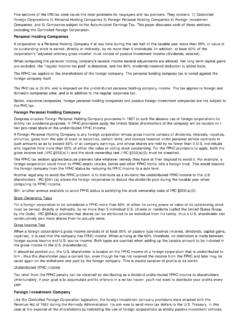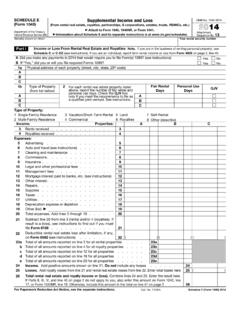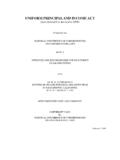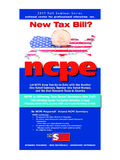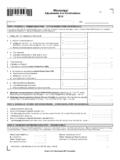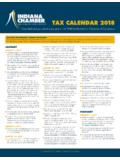Transcription of Controlled Foreign Corporation Tax Guide - AVC ADVISORY
1 Controlled Foreign Corporation Tax Guide Under limited circumstances, a person can be a shareholder of a Foreign Corporation who is not required to pay income taxes on the income of the Corporation until that income is distributed to the owners as a dividend (or possibly as a salary). Many years ago, the income of Foreign corporations was not taxed unless it was derived from sources. In 1962, exceptions were created to deter the use of Foreign corporations as a way to avoid taxes. These exceptions have evolved into the insanely complex rules referred to as the " Controlled Foreign Corporation " rules. shareholders of a Controlled Foreign Corporation (CFC) are subject to current income tax on "certain" income of the CFC. Generally, Foreign investment income and certain kinds of Foreign source business income are subject to current taxation to shareholders. This report attempts to provide a simplified and abbreviated explanation of the "certain" types of income that are taxable and not taxable.
2 Source Income of a Foreign Corporation A Foreign Corporation , whether owned by shareholders or Foreign shareholders, may be subject to income taxation. If the Foreign Corporation has source business income (defined in IRC Section 861) that is effectively connected with the conduct of a trade or business or if the Foreign Corporation has a permanent establishment in the , then it is subject to taxation. The Foreign Corporation , irrespective of who the shareholders are, will file a Form 1120 and pay corporate income taxes on its source income from a trade or business in the If the Foreign Corporation is subject to income taxation and it also has shareholders, then later distributions to those shareholders, if treated as dividend distributions, will be subject to an additional personal income tax (double tax since the Corporation receives no deductions for dividends paid). However, this is the same treatment as dividends received by shareholders of corporations.
3 The has no taxing authority over a Foreign Corporation with no source income and no permanent establishment in the However, the tax laws do have taxing authority over shareholders (as defined below) of Foreign corporations. Description of Shareholders This authority of taxation comes from the Controlled Foreign Corporation rules that tax shareholders on "subpart F" income (described below). A Controlled Foreign Corporation is one in which shareholders own more than 50 percent, by vote or value, of the Foreign Corporation . Only persons can be " shareholders." IRC. Section 957(c) refers to IRC Section 7701(a)(30) for the definition of a person (which is very broadly defined to include individuals, partnerships, corporations, trusts and estates). A shareholder, for purposes of determining whether there is a Controlled Foreign Corporation , is one who owns 10 percent or more, by vote, of the Foreign Corporation [IRC. Section 951(b)]. In determining the 10 percent or more ownership, the attribution rules (described below) of both IRC Section 958(a) and IRC Section 958(b) apply.
4 Once it is determined (through direct ownership, indirect ownership under IRC Section 958(a) and constructive ownership under IRC Section 958(b)), that there are, in the aggregate, shareholders who own more than 50 percent, by vote or value, in the Foreign Corporation , it is classified as a Controlled Foreign Corporation (CFC). Please note that only those shareholders that own (directly or indirectly) 10 percent or more of the Foreign Corporation stock are included in the "more than 50 percent" ownership test. Thus, a Foreign Corporation with twenty shareholders with equal shares of 5 percent of the Foreign Corporation is not a CFC. Or, if a Foreign person owns 50 percent or more of the Corporation , then no combination of persons can own "more than 50 percent" of the Foreign Corporation . If one person owns 40 percent of a Foreign Corporation , and ten persons each own 6 percent, it is not a CFC, even though persons own 100 percent of the stock.
5 Only one of those persons is a " shareholder" as defined for this purpose. However, each person's ownership percentage is determined by taking into account the attribution and constructive ownership rules. The phrase "attribution" means that one taxpayer is deemed to own the shares of certain other related taxpayers - such as a spouse, child or parent - because the law presumes that these persons have a common interest. "Constructive ownership" is the same as attribution but it is usually applied with respect to entities in which the taxpayer has some control or beneficial interest. A beneficiary of a trust or estate is deemed to own a portion of any stock owned by the trust or estate, based on the rights of the beneficiary with respect to distributions from the trust or estate. A 50 percent or more shareholder of a Corporation or 50 percent or more partners in a partnership are deemed to have a proportionate interest in stock owned by the Corporation or partnership.
6 Thus, ownership of a Foreign Corporation is derived from the direct ownership of the taxpayer plus any indirect ownership arising from the attribution and constructive ownership rules. With respect to Foreign corporations, these rules are insanely complicated and this is the shortest explanation without getting involved in the maze of code sections relating to this subject. However, these terms will be further discussed below in connection with the explanation of "subpart F" income. Description of Subpart F Income Subpart F income is defined under IRC Sections 952 - 954. The following is a general summary of the income that is classified under subpart F. Basically, " source income" means income derived from conducting a trade or business in the , income from services performed in the and income from property located in the It also includes dividends on the stock of corporations and interest on bonds or other evidences of debt from sources. (There are exceptions of course.)
7 There are two categories of "subpart F income" that are discussed below, but the following are the five categories listed in IRC Section 952: (1) insurance income as defined at IRC Section 953;. (2) Foreign base company income as defined at IRC Section 954;. (3) income from countries subject to international boycotts [IRC Section 999];. (4) illegal bribes, kickbacks and similar payments [IRC Section 162(c]; and (5) income from countries where the has severed diplomatic relations [IRC Section 901(j)]. The major category applicable to most Foreign corporations is " Foreign base company income,". which is defined to include: (1) Foreign personal holding company income [IRC Section 954(c)];. (2) Foreign base company sales income [IRC Section 954(d)];.(3) Foreign base company services income [IRC Section 954(e)];. (4) Foreign base company shipping income [IRC Section 954(f)]; and (5) Foreign base company oil related income [IRC Section 954(g)].)
8 Foreign personal holding company income is basically income from passive investments such as interest, dividends, certain rents, royalties and capital gains. " Foreign base company sales income" is defined by IRC Section 954(d), which provides the exact definition. However, it generally includes income from selling personal property purchased from a related person or sold to a related person. For this purpose, a "related person" is an individual, Corporation , partnership, estate or trust that controls the CFC or is Controlled by the CFC. With respect to a partnership or Corporation , "control" means more than 50 percent. The phrase "related person" is defined in IRC Section 958 but that takes you through a maze of code section cross-references and exceptions. Basically, a related person includes a spouse, children, grandchildren or parents (see IRC. Section 318) and any estate or trust in which the person is a beneficiary. It also includes any Corporation or partnership that is owned 50 percent or more by the taxpayer or which owns 50.
9 Percent or more of a Corporation or partnership. It does NOT include an individual who is a non-resident aliens even if that individual is related to the taxpayer. [IRC Sections 958(b)(1) and (4).]. The "bottom line" of these confusing rules is that income from a trade or business conducted entirely outside the is not subpart F income unless a "related" party is involved. For example, assume shareholders own a Bahamian-domiciled company. If the Bahamian company buys "widgets" from unrelated sources and sells them to unrelated sources, such income is not subpart F income and the profits (if any) are tax-deferred to the shareholders until they are distributed as dividends. " Foreign base company services" income is defined as "income (whether in the form of compensation, commissions, fees or otherwise) derived in connection with the performance of technical, managerial, engineering, architectural, scientific, skilled, industrial, commercial or like services which: (A) are performed for or on behalf of any related person (within the meaning of subsection (d)(3), and (B) are performed outside the country under the laws of which the Controlled Foreign Corporation is created or organized.)
10 ". As a practical matter, international business companies formed in most tax haven countries are not permitted to conduct business in that country, so that any services provided by the company are subpart F income if the services are performed by any person (like a shareholder). "related" to the Corporation . This is not referring to the definitions of Foreign base company shipping or oil income. If the Foreign Corporation has subpart F income, then, to the extent of the earnings and profits of the Corporation , those earnings are taxable each year, whether distributed or not, to the 10. percent or more shareholders who are determined by direct ownership or the attribution rules under IRC Section 958(a) (but not IRC Section 958(b)). "Earnings and profits" is another complicated subject that is difficult to briefly explain, but it is not the same as taxable income. "Earnings and profits" is more closely related to the accounting income of the Corporation even though some items are not taxable and some items are not deductible.
